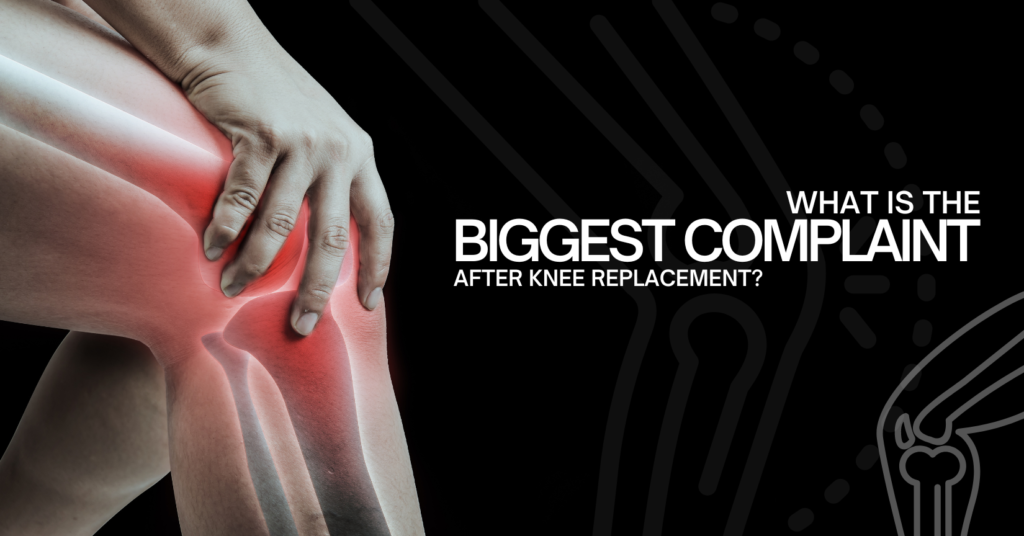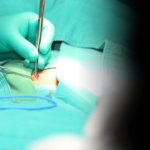
An increasing number of people are finding that knee replacement surgery, which is a common procedure to address chronic knee pain and mobility issues, provides them with hope. On the other hand, despite the fact that it provides relief, patients frequently face difficulties during the recovery process. In spite of the fact that the procedure was supposed to be beneficial, one of the most common complaints that patients have after surgery is that they continue to experience pain and discomfort.
Understanding Knee Replacement:
Understanding Knee Replacement, It is essential to have a solid understanding of the fundamentals of knee replacement surgery before delving into postoperative complaints. Over the course of this procedure, artificial implants, which are typically made of metal or plastic, are used to replace damaged knee joint surfaces. Pain relief, increased mobility, and the restoration of joint function are the objectives of this treatment.
Persistent Pain:
Pain that does not go away, the most significant obstacle
Patients who have undergone knee replacement surgery frequently express concern regarding the continuation of pain and discomfort after the procedure. Even after the initial period of recovery, there are some people who continue to struggle with varying degrees of discomfort, which makes it difficult for them to fully accept the results of the surgery.
Causes of Persistent Pain:
The causes of persistent pain after knee replacement surgery can be multifaceted and include a variety of factors. Surgical complications, which can include nerve damage, infection, or misalignment of the implant, are the primary causes of this condition. An infection can cause inflammation and damage to the tissues, which can make the pain even worse. As a result of misalignment or improper positioning of the implant, biomechanical issues can arise, which can lead to discomfort associated with movement. Even though nerve damage is rather uncommon, it is possible for it to cause neuropathic pain that lasts beyond the typical healing period. The development of scar tissue, also referred to as fibrosis, is another condition that frequently results in ongoing pain. It is possible for excessive scar tissue to develop around the surgical site, which can restrict joint movement and result in stiffness and discomfort because of the restriction. Additionally, friction and instability can be caused by implant wear or loosening over time, which can lead to chronic pain. Muscle weakness and imbalance, which are frequently made worse by pre-existing conditions such as diabetes or obesity, can further contribute to increased stress on the joint, which in turn amplifies the sensations of pain.
Impact on Patients:
The persistence of pain following knee replacement surgery significantly affects various aspects of patients’ lives. By limiting their physical capabilities, it makes it more difficult for them to carry out activities that they normally do, such as walking, climbing stairs, or engaging in recreational activities. It is possible for pain to cause sleep disturbances, which can then lead to fatigue and make emotional distress even worse. Patients who are experiencing chronic pain may experience a decline in their confidence in the outcome of their surgical procedure, which may hinder their willingness to participate fully in rehabilitation efforts. A prolonged recovery process can be the result of this, which can have a negative impact on the individual’s overall quality of life as well as their emotional well-being.
Addressing the Issue:
Addressing the Problem In order to effectively manage persistent pain, it is necessary to take a holistic and individualised approach that takes into account both the physical and psychological aspects of the patient’s experience:
Pain Management Techniques:
Techniques for the Management of Pain The utilisation of a combination of pharmacological interventions, including nonsteroidal anti-inflammatory drugs (NSAIDs), opioids, and nerve pain medications, can be of assistance in the alleviation of pain. In addition, symptomatic relief can be achieved through the utilisation of physical therapy modalities such as ultrasound, heat therapy, or transcutaneous electrical nerve stimulation (TENS). Patients may also benefit from the implementation of mindfulness-based techniques, relaxation exercises, and biofeedback treatments in order to better manage their pain and improve their overall coping mechanisms.
Rehabilitation and Exercise:
It is essential to design a specialised rehabilitation programme that focuses on strengthening the muscles that surround the knee joint in order to improve the stability and function of the knee joint. Proprioception, balance, and range of motion are all areas that could be improved through the use of exercises. Patients who experience persistent pain may benefit from low-impact activities such as stationary cycling or aquatic therapy because these activities offer a gentle and controlled movement that does not place an excessive amount of stress on the joint’s structure.
Revision Surgery:
In situations where conservative measures are not successful in alleviating pain or when underlying complications continue to persist, revision surgery may be necessary. During this procedure, components of the knee implant are either repaired or replaced in order to address issues such as the implant becoming loose, being misaligned, or experiencing excessive wear. In order to achieve the best possible results and reduce the likelihood of experiencing additional complications, revision surgery calls for careful consideration and planning.
Lifestyle :
It is possible to alleviate pain and reduce stress on the knee joint by educating patients about lifestyle modifications. These modifications include adopting proper body mechanics, maintaining a healthy weight, and avoiding activities that have a high impact on the knee joint. Dietary interventions for the management of chronic pain and the promotion of joint health may also play a role. These interventions may include the consumption of anti-inflammatory foods and supplements.
Psychological Support:
Patients may find it easier to deal with the emotional toll that persistent pain takes on them if they are provided with psychological support and counselling services. Patients can be empowered to develop effective coping mechanisms and regain a sense of control over their pain experience through the utilisation of techniques from cognitive-behavioral therapy (CBT), relaxation training, and stress management strategies.
Healthcare providers have the ability to improve patient outcomes, increase patient satisfaction, and facilitate a more seamless recovery journey for their patients by incorporating these comprehensive approaches into the management of persistent pain following knee replacement surgery.
In conclusion, in order to effectively treat persistent pain that occurs after knee replacement surgery, it is necessary to take a multifaceted and individualised approach that takes into account the underlying causes as well as the specific requirements of each individual patient. Though there are a number of factors that can contribute to persistent pain, including surgical complications, scar tissue formation, implant wear, muscle weakness, and pre-existing conditions, effective management strategies have the potential to alleviate symptoms and improve outcomes.It is possible for healthcare providers to assist patients in navigating the challenges of persistent pain and improve their overall recovery experience by incorporating pain management techniques, rehabilitation and exercise programmes, revision surgery when it is deemed necessary, modifications to the patient’s lifestyle, and psychological support. It is of the utmost importance to equip patients with the knowledge and tools necessary to effectively manage their pain, both physically and emotionally, in order to maximise their quality of life and restore function after surgery.
Furthermore, improvements in the management of persistent pain following knee replacement surgery are being driven by ongoing research as well as advancements in surgical techniques, implant materials, and intervention protocols for rehabilitation. It is possible for healthcare providers to further improve patient outcomes and satisfaction over the long term by maintaining a current awareness of emerging evidence-based practices and adopting a collaborative approach to care.In the end, healthcare providers are able to assist patients in their journey towards experiencing restored mobility, function, and overall well-being after knee replacement surgery if they address persistent pain in a comprehensive and compassionate manner. It is possible for us to make every effort to reduce the impact of persistent pain and to maximise the benefits of this life-changing procedure for all individuals who are undergoing knee replacement surgery. This can be accomplished through dedication, innovation, and personalised care provision.
Conclusion
In order to effectively treat persistent pain after knee replacement surgery, a multifaceted and individualized approach is necessary. By understanding the underlying causes and implementing a combination of treatment strategies, patients can experience significant relief and improve their overall outcomes.
If you are considering knee replacement surgery or are experiencing persistent pain after the procedure, consult with a qualified healthcare professional. They can guide you through the recovery process, address any pain you may be experiencing, and ensure you achieve the best possible results.
For more information about knee replacement surgery and persistent pain, you can visit credible patient education resources from organizations like the American Academy of Orthopaedic Surgeons (https://aapkacare.com/)
Empowering Patients Through Knowledge
This blog has equipped you with knowledge about persistent pain after knee replacement surgery. Remember, you are not alone in this journey. By working collaboratively with your healthcare provider and adhering to recommended treatment plans, you can manage your pain and achieve a renewed sense of mobility and well-being.
The Future of Knee Replacement
Ongoing research and advancements in surgical techniques, implant materials, and rehabilitation protocols are continuously improving the management of persistent pain after knee replacement surgery. As these advancements progress, patients can expect to experience even better outcomes and a faster return to an active lifestyle.
I hope this information empowers you to make informed decisions about your healthcare.



